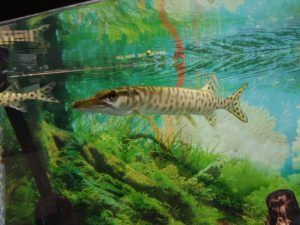O-Fish-al AmeriCorps training at Wolf Lake Hatchery
One of the exciting things about being an AmeriCorps member is getting to explore new places in Michigan, whether it’s for an event or training. During April training, AmeriCorps service members visited the Wolf Lake State Fish Hatchery in Mattawan. Established in 1927, Wolf Lake Hatchery currently produces steelhead trout, chinook salmon, walleye, and Great Lakes muskellunge for Michigan’s inland and Great Lakes waters.
Our training started with a tour led by Shana Ramsey, Wolf Lake’s Fisheries Interpreter. Shana explained the day-to-day operations of the hatchery, which species and how many fish they raise, and where the fish are stocked. She led us through the facilities that house millions of walleye and salmon eggs, as well as the pools where millions of fry (young fish) are kept until they mature. After showing us the inside facility we moved outside to see the grounds and the raceway, where mature fish are housed until they are loaded into trucks to be taken across the state to be stocked. After showing us the muskie grounds, we moved back inside the visitor center to learn more about careers in hatcheries from both Shana and Natural Resources Manager, Matt Hughes.

To conclude our tour of the hatchery, we learned about communication styles, meeting facilitation and decision-making in the workplace. Overall it was a very eye-opening experience as I never knew how intricate and detail-oriented fish hatcheries were. A career in fisheries is a potential option for me to pursue after my service term is finished in November.
The post O-Fish-al AmeriCorps training at Wolf Lake Hatchery appeared first on Michigan United Conservation Clubs.
Recent Posts



